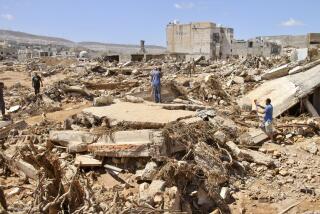Libya Hopes Lockerbie Payout Will Improve U.S. Ties
- Share via
TRIPOLI, Libya — The Libyan government said Saturday that it hoped a $2.7-billion deal on the 1988 Pan Am bombing would help to improve ties with the United States, but the cash payout was seen as a hollow victory for some families of those who were killed.
“We hope that we can close this file as soon as possible,” Libyan Foreign Minister Mohammed Abderrahmane Chalgam told CNN. “We want to work also with the Americans on bilateral relations.”
In a letter delivered Friday to the U.N. Security Council, Libya said it “accepts responsibility for the actions of its officials” in the bombing of the Pan Am jumbo jet over the Scottish town of Lockerbie that killed 270 people.
It was an admission Libya had long resisted despite U.N. economic sanctions and an image as an international pariah.
“It’s a political decision. We want to solve this problem to have the sanctions lifted for the benefit of our economy,” Chalgam said.
Under a deal years in the making, the admission could lead to the families of each victim receiving up to $10 million.
Yet for some families of the passengers who died in the bombing, it was answers -- not cash -- that counted.
“We are not interested in pursuing compensation. We are interested in pursuing answers,” said Jean Berkley of Britain, whose son Alistair was killed.
“Who was behind it for a start? I don’t think anybody thinks it was only one Libyan acting on his own,” she said.
In 1999 Libya turned over two suspects, Abdel Basset Ali Megrahi and Lamen Khalifa Fhimah, to stand trial in the bombing. Megrahi, a Libyan intelligence agent, was subsequently convicted in 2001, while Fhimah was acquitted.
“The Libyan statement only accepts responsibility for the actions of their officials, not the state accepting any responsibility for what’s happened,” Berkley said.
Chalgam told CNN that Libya wanted to know who was behind the bombing.
“We want to go together ahead in the future to discover the reality of that story,” he said.
“We are confident that when we are going to normalize our relations we will cooperate and we hope that [we will discover] the reality and the exact proof [of] who was behind that tragedy because it is to the benefit of the Libyans and the families of the victims.”
In a sign that Libya was intent on coming in from the diplomatic cold, the German magazine Der Spiegel said Saturday that Tripoli was set to compensate non-American victims of a 1986 bombing of a Berlin disco frequented by U.S. troops.
Two U.S. soldiers and a Turkish woman were killed and more than 200 people injured in the blast, which prompted U.S. reprisal bombings on Libyan cities.
Der Spiegel quoted Burkhard Koetke, one of the lawyers representing 67 non-Americans injured, as saying, “We are hopeful the matter will be concluded this year.”
The magazine said agreeing on compensation for the U.S. victims would be more difficult as a claim had been filed in the United States for $3 billion.
On the subject of Lockerbie, Libya’s U.N. envoy Ahmed Own said in a three-page letter that Tripoli “is committed to be cooperative in the international fight against terrorism” and pledged “to refrain from becoming involved in any acts of terrorism.”
The U.S. and Britain said that, once the money from Libya was deposited in an account, possibly as early as Tuesday, they would be prepared to press the U.N. Security Council to lift the sanctions imposed against Libya in 1992.
The deal would not affect separate U.S. sanctions, including a ban on imports of Libyan oil to the United States.
The White House said Friday that it would keep U.S. sanctions in force until Libya addressed its concerns, including Libya’s suspected pursuit of weapons of mass destruction and its human rights record.
Libyan Foreign Ministry spokesman Hassouna Chaouch defended the deal, which some Arab critics had said would be a drain on Libya’s financial resources. Other Libyan officials said privately that a normalization of ties with Washington and a return of U.S. investors, including oil firms, would compensate for the cost.
More to Read
Sign up for Essential California
The most important California stories and recommendations in your inbox every morning.
You may occasionally receive promotional content from the Los Angeles Times.










